Gareth Thomas on tackling HIV stigma: ‘My husband is HIV-negative and we have an active sex life’
The former Wales rugby captain initially thought his HIV diagnosis was a death sentence. Now he's fronting a new campaign to end the stigma.
By Will Stroude
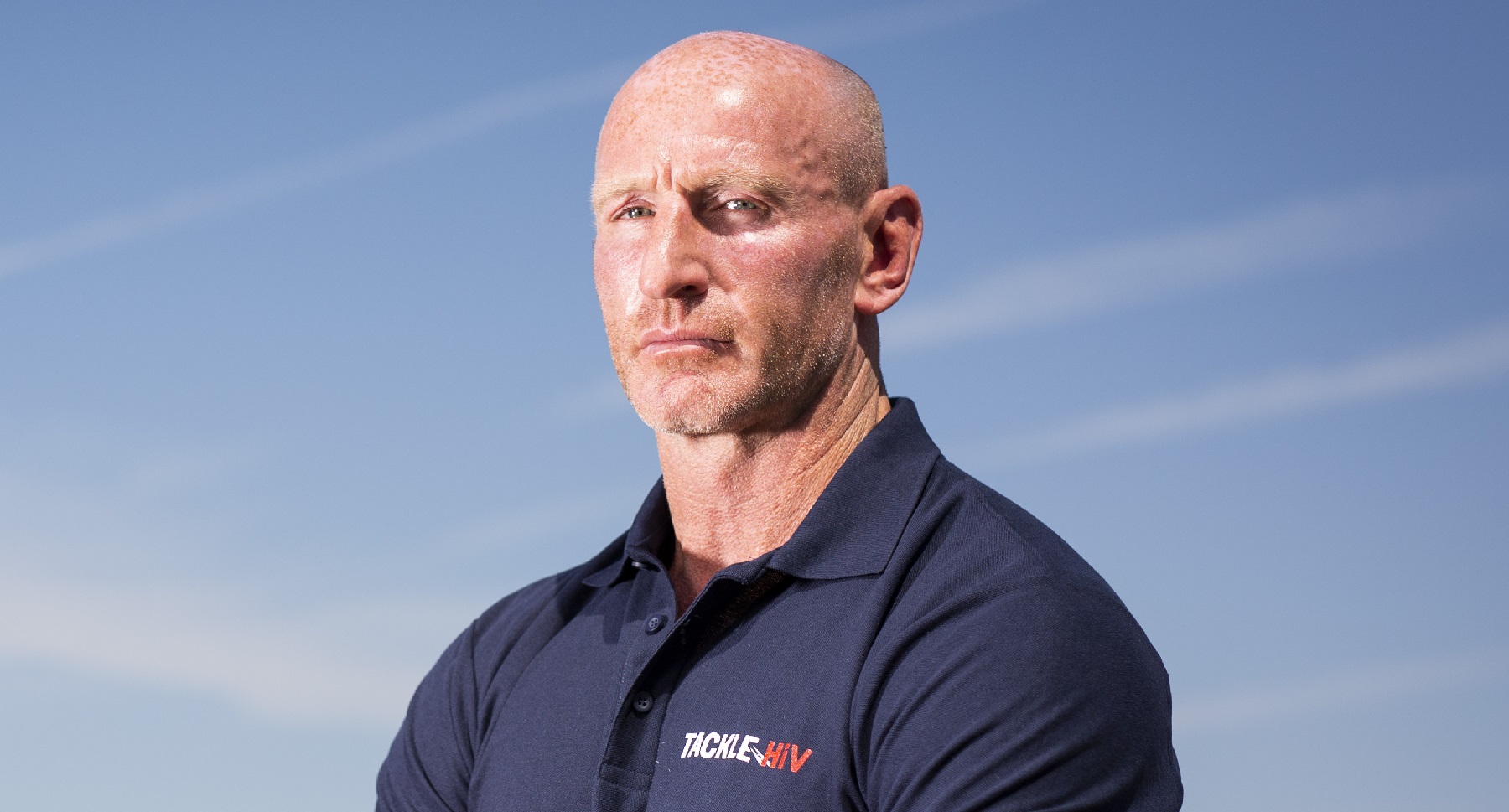
Words: Will Stroude
It’s a little over a year since Gareth Thomas tearfully declared at the Attitude Awards: “I have HIV – but HIV doesn’t f***ing have me.”
The former Wales rugby captain, who was accepting the Gamechanger Award at the annual awards ceremony in London, had just days before spoken publicly about living with HIV for the first time after being blackmailed by the tabloids.
For Thomas, 46, the road from diagnosis to confidence in sharing his HIV status was not an easy one, with many of the fears of someone who came of age in the ’80s and ’90s still firmly at the forefront of his mind.
Now, in a bid to end the stigma which still surrounds HIV, Gareth is leading a new campaign in partnership with ViiV Healthcare and the Terrence Higgins Trust, Tackle HIV, which aims to tackle fear and misunderstanding around the virus…
Casting your mind back, how clued up were you about life with HIV in this day and age when you were diagnosed? Did you have any stigmas you had to unlearn?
I thought I was going to die when I was diagnosed with HIV. The first thing I considered was how long I had left to live and I was going to be able to tell my parents. I had a whole learning process in front of me and it took me some time, because for a while during my hospital visits I wasn’t listening to what they were saying because I didn’t want to be in the hospital, I didn’t want to be seen in the hospital, I just wanted to get in and out. It was a long, long process for me to finally listen and be educated. When you’re living a lie, or a secret, the last thing you want to do is walk into a Terrence Higgins Trust Centre or a public space.
Had you been better educated, do you think you would have been able to turn to those closest to you sooner?
Without a doubt. I like to think if I had been educated it would have been a subject I’d have spoken about with my parents, my nieces, my nephews…
Did you have difficulty accessing information about HIV when you were diagnosed?
It is still difficult. It’s difficult to listen. I think what happens is that people carry stigma prior to getting tested, so they’re going in there with the stigma and the fear. Stigma isn’t always about them: it can be what they feel other people will feel about them. So maybe they are educated but are fearful that their parent or friends aren’t going to be. Stigma comes in many forms, and when a person has to lie, they live with the fear of lying. It can become a chain of events, and it all starts with stigma. Eradicating stigma is a huge part of why we do Tackle HIV – not just for the individual, but the for the people connected to the individual as well.
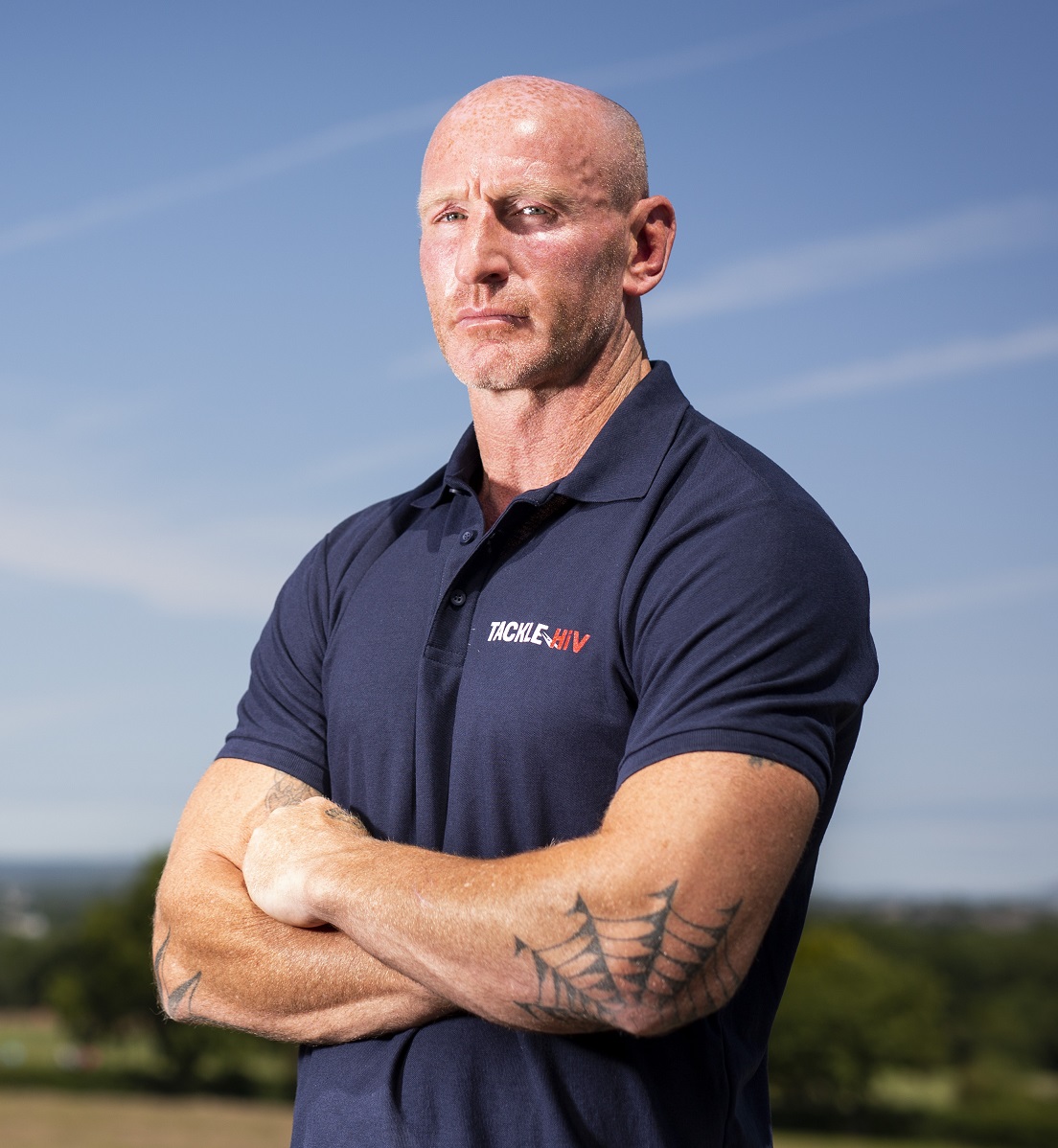
Tackle HIV, a new campaign led by Gareth Thomas in partnership with ViiV Healthcare and the Terrence Higgins Trust, aims to tackle the stigma and misunderstanding around HIV
Have you faced stigma yourself your HIV status? Is there a particular misconception you find yourself regularly having to challenge?
You know what, it’s interesting you ask that question because there’s a topic I’ve been wanted to address, and that’s language: I feel there’s a lot of stigmatised language actually within the gay community. A friend of mine found a lot of the negativity was coming from the gay community and people shunning him and asking whether he’s ‘clean’. That has such a negative connotation and in a community where people are at high risk of having HIV, they should understand the power of derogatory language more than anyone else. It’s embedded in the community and we’ve allowed that to become the way we ask the question. That’s one thing I want to try and get people to change: if you want to know whether someone is living with HIV, ask them if they’re living with HIV. Don’t ask them if they’re ‘clean’.
According to research by Tackle HIV and the Terrence Higgins Trust, more than half of people surveyed said they’d consider ending or not pursuing a relationship with someone if they were living with HIV. What would you say to those people who consider HIV to be a ‘deal-breaker’?
If you have the knowledge you’d realise that if somebody is living with HIV and on effective treatment, there is no risk of that person transmitting HIV. The fact that people might not want to have a relationship with someone who has HIV and is on effective treatment doesn’t make sense. All it says to me is that they either don’t know the facts or don’t believe them. My husband is HIV-negative and we have an active sex life. There are so many people who are living proof of this, and yet people still choose to believe the myths of 20, 30 years ago. Everything you thought you knew about HIV, forget about it and listen to the current news.
Have you ever experienced rejection from potential partners because of your HIV status?
No, I’m lucky I haven’t. But you know what, it’s difficult enough to be intimate with people when you’re HIV-positive, and when you face that rejection it’s kind of like finding out you have HIV all over again. It’s a constant kick-down. I’m lucky I haven’t had that, but so many people are judging people not on their personality or looks but on their HIV status, and there’s no need for that to be an issue in 2020 if they’re on effective treatment.
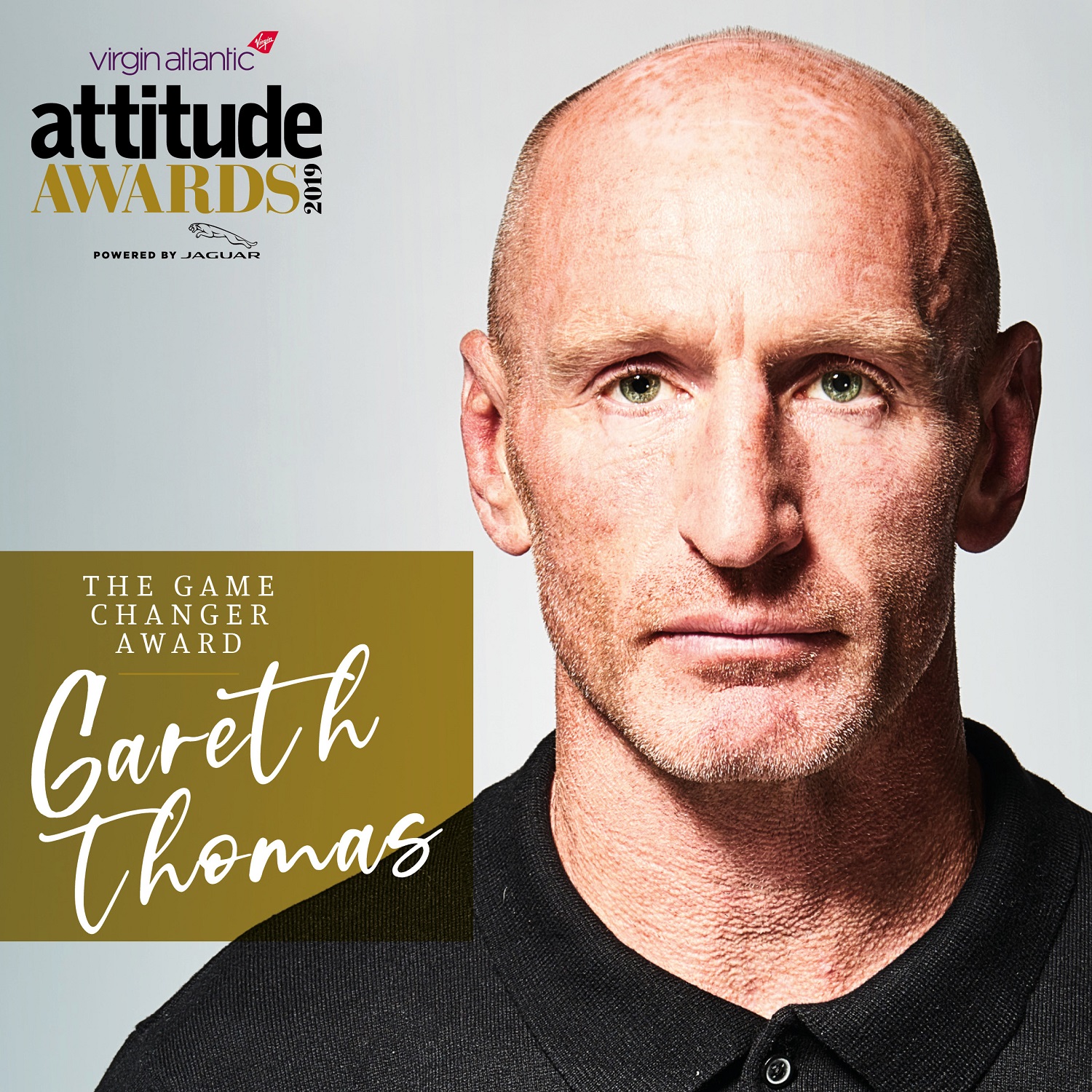
Gareth Thomas received the Attitude Gamechanger Award in 2019, just days after opening up publicly about living with HIV
The way the tabloids treated your HIV status as a ‘secret’ to be exposed speaks to how much stigma remains when it comes to HIV, doesn’t it?
If I had diabetes or cancer, it wouldn’t be something the tabloids would blackmail me with. The fact that HIV is something they felt they could use against me as blackmail… If you ask medical professionals, living with diabetes can be deemed a ‘worse’ condition, but we live in this society where any form of sexual activity – even though it’s something we all do – it’s something that’s deemed headline news. For me, the fact they used it against me demonstrates that it’s considered negative, and why I’m doing this campaign to try to normalise it.
Do you still feel anger towards the people who put you through that?
No. It’s all gone. The minute I took control of my own life I took control of them, where they felt they had to control of me. It’s a year ago that I spoke about my HIV, and it’s a year since I felt I won. I don’t hold a grudge or any hatred towards them, because I sit here as somebody who morally won.
Do you think more needs to be done when it comes to teaching about the realities of HIV today in schools?
Yeah, definitely. School is about educating people about life as well, and whether we decide to talk about it or not, sex is a huge part of most people’s lives in one way or another. Your sexual health and awareness is a very important thing. HIV isn’t just a virus that’s in the gay community or the Black African community, it’s a virus which everybody is potentially at risk of, so it’s something everybody needs to know about. I know that in school I had the most basic of sexual health education, so to have it as part of the curriculum and not something you just skim over is something that’s going to play a part in making England the first country in the world to have zero HIV transmissions. People in school now are the people who’ll be sexually active in the next ten years.
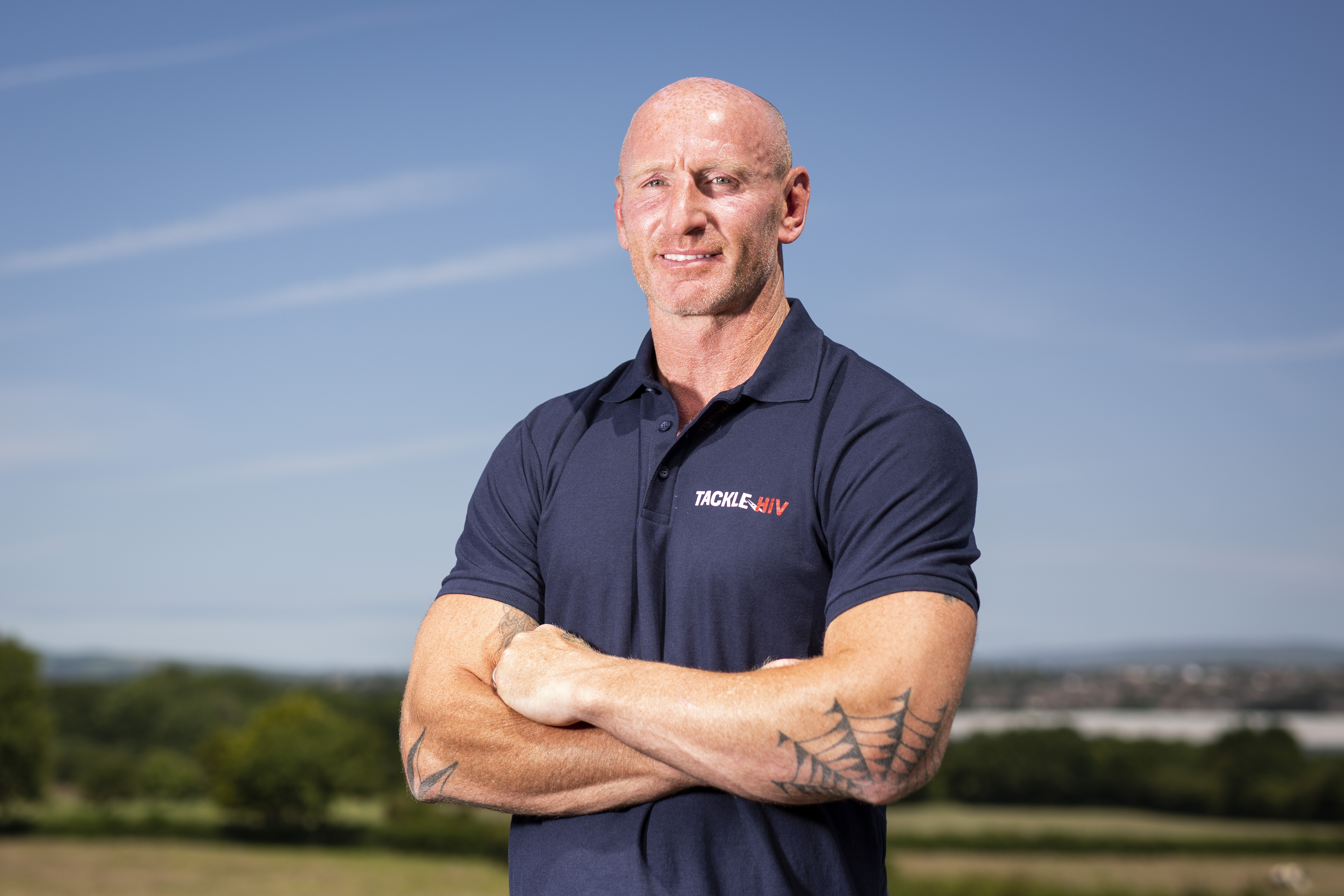
Rugby player Levi Davies recently came out publicly as bisexual – how does it feel knowing that your own decision to do that a decade ago has helped pave the way for people like him?
Well I did it [coming out] for personal reasons, but I also did it to try and create and environment where people could play rugby to the best of their ability without worrying about being judged for their sexuality. To see people in all sports, especially Levi, be open about their sexuality and seeing such support, for me it’s really really nice to see. I think – actually, I know – we’re far from having a fully diverse and inclusive environment within professional sport because there’s still hardly any openly [gay] top male sports stars in any sport, so I still think we’ve got a long way to go. But every time somebody does it creates a sense on inspiration and belief for children to look up to, to feel like ‘Well I can play rugby because I’ve seen these stories and that these people have continued to be successful.
As someone who’s had to navigate both the gay scene and the world of professional sport, what would your advice to Levi be?
Well, what I would say is that whatever happens in life you become a role model, and role models are people who always try to do good things – but also realise that you can never please everybody all the time. I’ve done things that were wrong and I don’t pretend to be perfect and a saint, but I’ve enjoyed my life and I’ve navigated to a life I’ve always dreamt of. Learn from the good things, but learn from the bad things as well. Don’t try to be perfect all the time.
You’ve been connected to this year’s series of ITV’s The Real Full Monty, which is for another great cause in the form of cancer awareness.
Ah yeah, I’m doing that! I am taking my kit off on the ice, that’s a scary thing, I’ll tell you. It’s for my grandad who passed away with cancer. And because of my grandad, my mother took my father to hospital and they found cancer – luckily they found in enough time. It’s a bonkers, crazy thing to do, but when you realise that you’re doing it for it eclipses the fear of doing it. You’re doing it for the people you love, so it makes it all worthwhile.
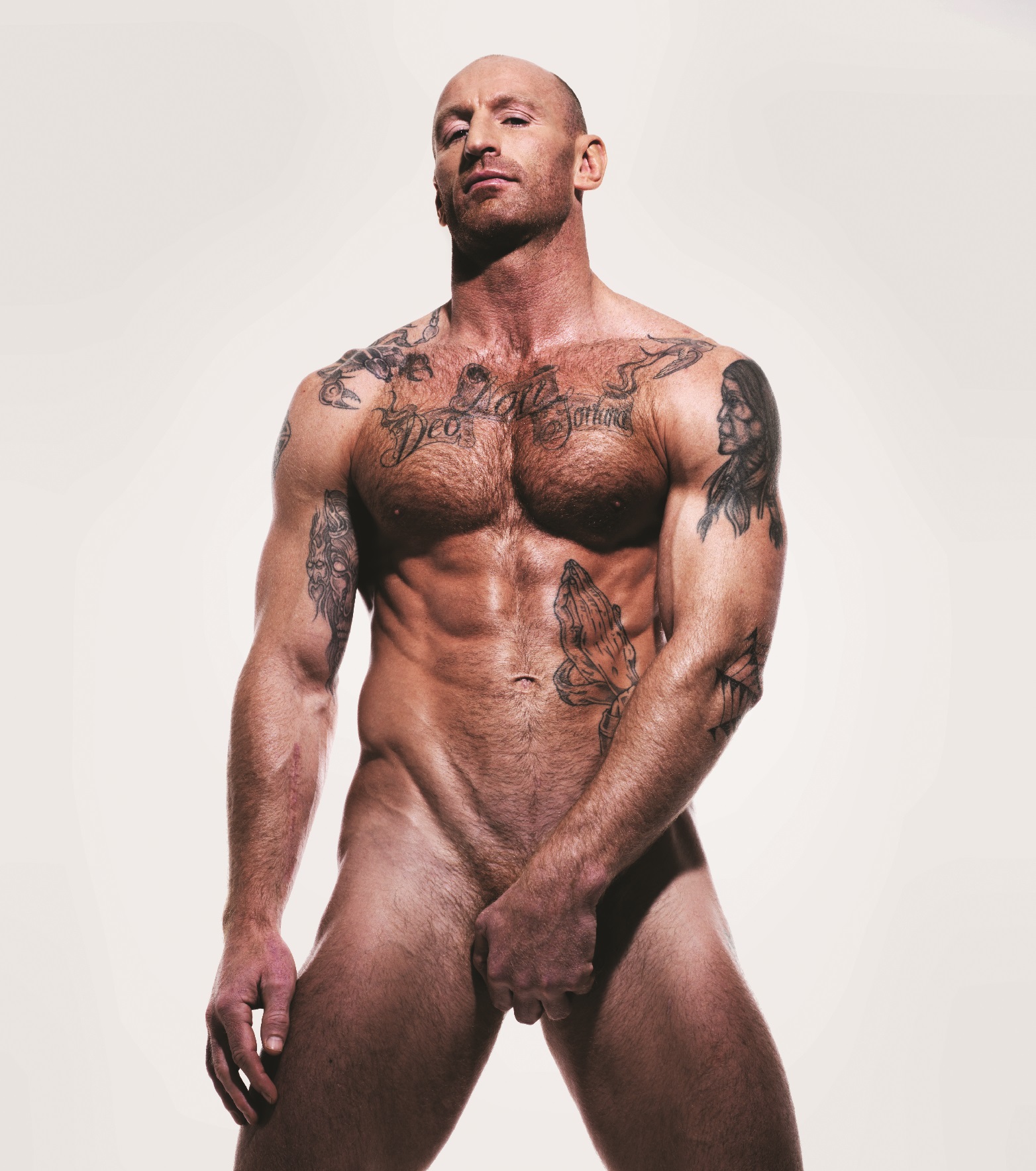
Gareth Thomas, who stripped off for the Attitude Naked Issue in 2012, will soon be appearing in ITV’s The Real Full Monty to raise awareness of cancer
Of course you memorably once stripped off for an Attitude Naked issue a few years back, so it’s certainly becoming a bit of a habit…
I did! I’ll never forget it. The weirdest part of that wasn’t the getting naked, it was between the shoots when I had a sock on my c**k for about 40 minutes! I couldn’t be arsed to put my clothes on so they got a sock and they kept it over my c**k. It was a big sock! [laughs]
How important do you think it is for people to see a man living with HIV stripping off and sexing it up alongside all the other boys?
I have no qualms in saying everything I do in my life since I’ve started speaking about my sexuality and HIV status is to represent a community of people that I’m un-f**king-believably honoured to represent. Everything I do is to represent where I come from, and that for me is the LGBTQ community and also the HIV community. Every day I live my life, I try to do it in a positive way to represent them and to make them proud.
Tackle HIV, a new campaign led by Gareth Thomas in partnership with ViiV Healthcare and the Terrence Higgins Trust, aims to tackle the stigma and misunderstanding around HIV.
For more information visit tacklehiv.org and follow on social media @tacklehiv.
